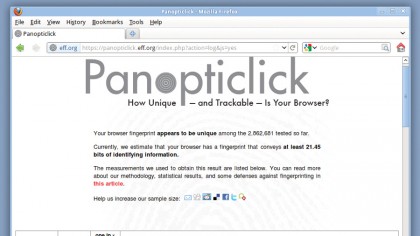The guys that fight governments that spy on you
Protecting your digital rights
In a court case, the EFF argued that the FCC should not be able to regulate what happens in our TVs and computers once they have received a broadcast signal, and the court agreed. This was an important step in asserting the rights we have to use and control the products that we buy.
Meanwhile, for many years the US Justice Department had been employing some very questionable surveillance techniques, such as monitoring the locations of suspects' mobile phones without sufficient warrants. The EFF has taken up the fight here, advising judges that they shouldn't grant such far-reaching and highly intrusive warrants without first being shown 'probable cause' of a crime - that is, a reasonable likeliness that a crime is being committed. It's an ongoing battle, but vital for protecting us against a creepy, Big Brother-esque state.
Cut-out-and-keep 'win the argument' guide
A lot of well-meaning types think that this is all a big hoo-hah and we don't need such strong defensive measures. Here are the arguments they typically use, and ammunition against them.
1. "I'm not afraid of Government X or Company Y!"
Good for you, but you don't know what X or Y will become in the future. You might have a decent government at the moment, but what happens with all the data they're collecting about you when someone else takes power? Would you still want all of these surveillance laws and communication monitoring techniques in place when a party that you deeply dislike takes over?
The same applies with companies - you might think Company Y is doing well currently with privacy issues and your data, but how will it behave in 10 years with a completely different set of top management?
2. "If you're doing something online that you don't want people to know about, maybe you shouldn't do it in the first place."
We all have a right to privacy, and there are plenty of legal, valid reasons why you'd want to do things on the net without being tracked and monitored. You might want to look up an awkward health problem, for instance, without related adverts appearing everywhere in the future. You might want to secretly book a holiday or buy a gift for a loved one and leave no trace of the purchase until the surprise moment. Perhaps you want to research something politically or historically sensitive, without red lights going off at government HQ.
3. "If Company X starts screwing me over, I'll just move to Company Y."
If only life were that simple. This isn't like changing to a different shop for your groceries - it can be extremely complicated. What happens to all of the books and music you bought from X, which only work on X's devices? Can you easily get all of your data out and easily import it into Y? What happens to all the profiling data that X gathered about you over the years - can you easily get it deleted? It's rarely this simple.
Get daily insight, inspiration and deals in your inbox
Sign up for breaking news, reviews, opinion, top tech deals, and more.
4. "Oh no! Won't somebody PLEASE think of the children!"
Calm down. I'll make you a lovely cup of tea.
Top tech EFF supported software projects aimed at protecting your freedom

1. HTTPS Everywhere
This Firefox and Chrome web browser extension tries to use HTTPS (secure) connections wherever possible, even when sites normally default to plain HTTP. This encrypts the data transfer between your computer and remote websites. Not all sites support HTTPS, or at least for every page, so you can disable the extension for selected sites via an icon click.
2. Panopticlick
A brilliant (and frankly, very scary) web page which shows just how much information your browser gives away to websites. Even if you have cookies disabled, websites may still be able to identify and track you based on a combination of data from your browser, such as the user agent string, plugin versions, screen size and installed fonts. This is your 'browser fingerprint', and if nobody else shares it on the internet, you're very easy to track.